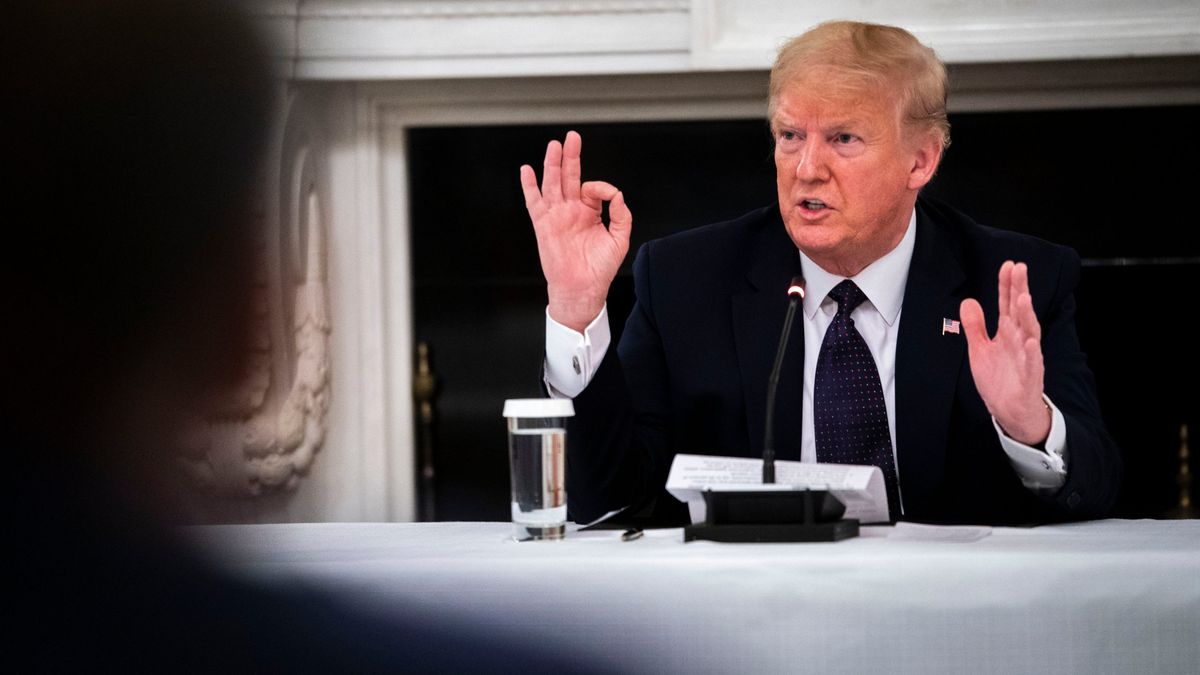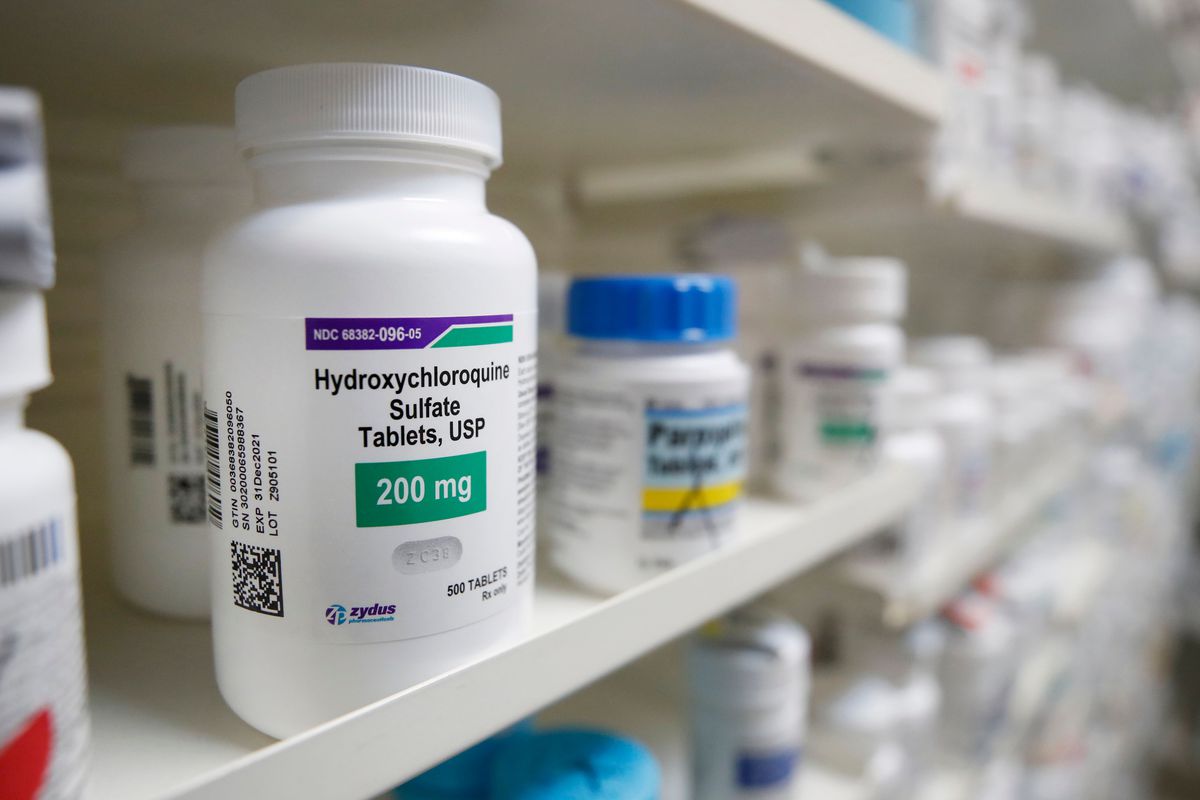What is hydroxychloroquine and does it actually work to combat COVID-19?

A few minutes every morning is all you need.
Stay up to date on the world's Headlines and Human Stories. It's fun, it's factual, it's fluff-free.
Through March, as the COVID-19 crisis in the United States was worsening, President Donald Trump championed an antimalarial drug, called hydroxychloroquine, as a possible cure for the virus. The supposed efficacy of the drug as a coronavirus treatment soon became a common talking point among conservative pundits and social media users.
In late April, however, the publication of multiple studies linking hydroxychloroquine to the deaths of some COVID-19 patients appeared to tamp down enthusiasm for the drug. But after Trump claimed in a recent press briefing that he was personally taking the drug, hydroxychloroquine has once again emerged as a partisan debate topic.
What is hydroxychloroquine?
According to a Center for Disease Control and Prevention (CDC) fact sheet on hydroxychloroquine, the drug “is an arthritis medicine that also can be used to prevent malaria.”
In the United States, hydroxychloroquine is only available by prescription and is sold under the brand name Plaquenil. As an antimalarial drug, it works to both prevent and treat the malaria parasite that infects humans through mosquito bites.
Though the CDC’s fact sheet says that hydroxychloroquine is a “relatively well tolerated medicine,” it lists four common side effects: stomach pain, nausea, vomiting and headache. It can also cause itching and, if used at high doses, retinopathy – damage to the retina of the eye – which can result in loss of sight.
Though the drug was originally created to treat malaria, its benefits in treating arthritis by decreasing pain and swelling have given it a classification as a disease-modifying anti-rheumatic drug.
Antimalarial drugs like hydroxychloroquine (and a similar drug, chloroquine) are often used to treat lupus, an autoimmune disease. While the exact reason such drugs help with lupus isn’t known, they are believed to modulate the immune system, thereby easing joint and muscle pain, inflammation and skin rashes.
Who is Dr. Didier Raoult?
Though multiple researchers have hypothesized that hydroxychloroquine could treat COVID-19, the idea was amplified by a French doctor named Didier Raoult. A brief study that Dr. Raoult published in mid-March claimed that his clinic had used hydroxychloroquine in combination with an antibiotic, azithromycin, to treat COVID-19 patients.
The remarkable results, which Raoult published in a one-and-a-half page study, claimed that of the 1,061 patients treated with the drug combination, 973 (91.7%) were completely cured of COVID-19 after 10 days. Only 10 patients were transferred to the ICU, five died, and another 31 needed extended treatment.
The interpretation of the study stated: “The [hydroxychloroquine-azithromycin] combination, when started immediately after diagnosis, is a safe and efficient treatment for COVID-19, with a mortality rate of 0.5% in older patients. It avoids worsening and clears virus persistence and contagiosity in most cases.”
A Daily Beast profile of the doctor reported that the “eye-popping” results led French President Emmanuel Macron to visit the doctor’s Marseilles-based research institute.
Unfortunately, the “scientific iconoclast” and “social eccentric” doctor’s study was immediately challenged by other researchers for its myriad flaws, including “the small sample size, the removal of patients from the study who died or had to be sent into intensive care, the fact that patients receiving the treatment were non-randomized.”
In both France and the scientific community in general, Raoult is a man who inspires mockery and scorn. A March profile of the doctor in the French-language Le Monde newspaper derisively said of him, “Didier Raoult has just entered the pantheon of local heroes embodying the rebellious spirit of [Marseilles], opposed to a stubborn Parisianism.”
His opposition to the well-established science of climate change, despite having no background in climatology, has earned him criticism from experts in the field. But, like his questionable embrace of hydroxychloroquine as a COVID-19 cure, it has also earned him a following among right-wing politicians and supporters, including US President Trump.
Could hydroxychloroquine cure COVID-19?

With COVID-19 spreading and the earliest predictions for an available vaccine being the end of 2020, it was reasonable for medical experts to seek out potential cures in existing drugs.
Doctors took to prescribing hydroxychloroquine to their patients on the chance that it had preventative properties for the coronavirus.
These doctors had reason to believe the drug might help. Previous research had found that antimalarial drugs could have an effect on the virus, at least in a lab setting. But months into the pandemic, many doctors have come to the conclusion that the drug is “useless” in the real-world treatment of COVID-19 in humans.
The virus continues to spread globally, with new COVID-19 hotspots still emerging. Furthermore, lupus patients have complained they are unable to get the medicine they need to treat their condition because the run on hydroxychloroquine has depleted the stock.
The dangers of hydroxychloroquine
Worse than being of no use, some research indicates that hydroxychloroquine can be harmful if misused.
On April 24, the US Food & Drug Administration released a warning, saying that the “FDA cautions against use of hydroxychloroquine or chloroquine for COVID-19 outside of the hospital setting or a clinical trial due to risk of heart rhythm problems.”
A French study and a separate American study, both published in late April, found no evidence to suggest that hydroxychloroquine works as a cure for COVID-19. Additionally, the American study, done by the Veterans Health Administration (VHA), determined that there was a higher risk of death linked to the drug.
At the time of the VHA study’s publication, Trump declined to comment, saying he didn’t know much about the study. For a time, Trump even stopped talking about the drug in coronavirus press briefings.
On May 18, though, Trump stated of hydroxychloroquine, “I happen to be taking it.” The next day, he called the VHA study a “Trump enemy statement.”
On Friday, May 22, The Washington Post reported on the largest study yet of hydroxychloroquine for COVID-19 patients. The findings, published in the Lancet medical journal, provided more evidence undermining the case for the drug.
“A study of 96,000 hospitalized coronavirus patients on six continents found that those who received an antimalarial drug promoted by President Trump as a ‘game changer’ in the fight against the virus had a significantly higher risk of death compared with those who did not,” the Post reported.
“People treated with hydroxychloroquine, or the closely related drug chloroquine, were also more likely to develop a type of irregular heart rhythm, or arrhythmia, that can lead to sudden cardiac death, it concluded."
Conservative support for hydroxychloroquine
With the White House confirming that Trump is taking the drug as a preventative measure, the partisan debate over hydroxychloroquine has been reignited this week. Conservative media has largely sided with Trump in promoting the drug as a possible cure for COVID-19.
In March, Fox News and other conservative outlets had widely touted the drug, even claiming it had a “Lazarus effect.” For a few weeks after the publication of the two studies in late April, the fervor for the drug mostly died off.
On May 5, the conservative One America News Network shared a video (since removed by YouTube) touting claims by the Association of American Physicians and Surgeons (AAPS) that “over 90 percent of patients treated with hydroxychloroquine successfully recover from the coronavirus.”
AAPS is a conservative non-profit association and has not directly overseen research on hydroxychloroquine.
On Fox News, host Neil Cavuto sparked anger from both the president and his supporters when he warned against using hydroxychloroquine on Monday.
“If you are in a risky population here and you are taking this as a preventive treatment to ward off the virus – or in a worst-case scenario, you are dealing with the virus and you are in this vulnerable population – it will kill you,” Cavuto stated. “I cannot stress enough: This will kill you.”
Coming on the same day that Trump claimed to be taking the drug, Cavuto’s remarks were seen as a rebuke of the president. That certainly appeared to be Trump’s takeaway. The president tweeted on Tuesday that Fox News has “more anti-Trump people, by far, than ever before. Looking for a new outlet!”
Opposing Trump on hydroxychloroquine
In April, Dr. Rick Bright claimed that Trump had him removed from his positions as the director of the United States Biomedical Advanced Research and Development Authority (BARDA) and the Health and Human Services’ (HHS) Deputy Assistant Secretary for Preparedness and Response.
Bright claims that his removal was due to his opposing the Trump’s administration’s advocacy of hydroxychloroquine.
Now, with Bright acting as a whistleblower on the issue, he has become a target of conservatives who claim that he is a Democrat attempting to hurt Trump’s reelection campaign. At the same time, liberals have praised the doctor for standing up to the president.
Have a tip or story? Get in touch with our reporters at tips@themilsource.com
Sign up for daily news briefs from The Millennial Source here!




Comments ()